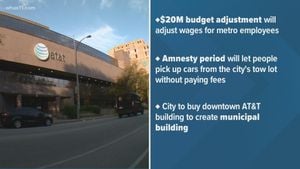The streets of Islamabad erupted on November 26, 2024, witnessing chaotic protests as supporters of former Prime Minister Imran Khan clashed with security forces, demanding his release from prison. The violence escalated dramatically, resulting in at least six fatalities, including four members of Pakistan's paramilitary forces, as tensions between the protesters and law enforcement peaked.
Thousands of supporters from Khan's political party, the Pakistan Tehreek-e-Insaf (PTI), defied police barricades and lockdown orders imposed by the government, surging toward the capital’s fortified Red Zone, which houses key government buildings and embassies. Eyewitness accounts revealed the energy of the crowd, determined to reach the legislature as they rallied for Khan's freedom, who has been imprisoned for over a year on corruption charges.
According to reports, the turmoil began as PTI activists approached Islamabad, igniting violent confrontations with authorities who had previously imposed strict bans on gatherings, seeking to prevent any escalations. Security officials fired tear gas and rubber bullets to disperse crowds as they surged through police lines, showing remarkable tenacity.
Prime Minister Shehbaz Sharif labeled the protests as “extremist” and accused Khan's supporters of deliberately attacking security personnel, claiming they caused the deaths by ramming vehicles at them. Sharif condemned the chaos, asserting, “It is not a peaceful protest,” and emphasized the need for maintaining law and order, indicating potential crackdowns on demonstrators as the government sought to stabilize the situation.
Contrary to the government’s narrative, PTI spokesperson Zulfikar Bukhari accused officials of exploiting misinformation to justify using excessive force. He remarked, “The police and the Rangers have attacked peaceful demonstrators — there are videos showing protesters assisting security officers.” His words reflected the growing frustration among Khan’s supporters who vowed to continue their demonstrations until their demands were met.
The protests not only underscored the political volatility surrounding Khan, who was ousted through a no-confidence vote and has faced over 150 criminal cases deemed politically motivated by his party, but also revealed the deep divisions within Pakistani society. Calls for Khan's release echo across social media as his supporters organized demonstrations against what they perceive as unjust treatment by the state.
Compounding the situation, international human rights organizations such as Amnesty International decried the government’s actions, labeling the response to protests as unlawful and excessive. The organization criticized the authorities for restricting the fundamental rights of peaceful assembly and expression, and claimed widespread violations of civil liberties took place throughout the protests.
The chaos of Islamabad was reminiscent of earlier protests across Pakistan, where Khan's supporters have regularly mobilized to advocate for his cause. Following the protests, internet services were suspended and mobile networks disrupted, limiting communication options amid growing unrest.
Responding to the order to control the situation, military forces were deployed to assist local law enforcement, as curfews were instituted across parts of the capital. The decision to fortify security was intended to preempt any more violent clashes and prevent the situation from spiraling out of control.
While Khan remains a polarizing figure, messages from him via social media platforms like X rallied his base, encouraging supporters from prison. He called on PTI activists to remain steadfast, insisting their demands for genuine freedom and rights should not waver.
The current unrest indicates not only discontent with the political establishment but also highlights the resentment among many voters against the military's perceived encroachment on civilian governance. Khan's imprisonment has ignited sentiments surrounding civil rights, and his supporters believe the military and current government are stifling their voices.
Despite the potential risks of escalation, PTI vowed to persist with protests, asserting their readiness to face whatever consequences might arise. The long-standing political rivalry, compounded by rising discontent, has put Pakistan at a crossroads, teetering between unrest and calls for reform.
What remains clear following the violence is the unresolved tension between the current government and Khan’s supporters, who have adopted direct action as the means of demanding accountability and justice. With Khan’s fate still uncertain and the political climate unstable, the resolution to this discord appears distant as citizens grapple with the sociopolitical ramifications of their demands clashing with government authority.



